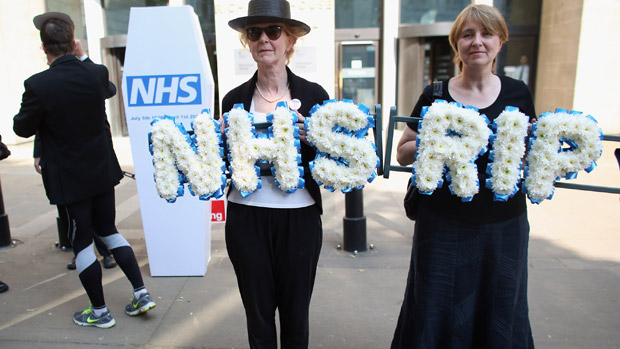NHS workers in first national strike for more than 30 years
Midwives, ambulance crews and thousands of NHS staff walked out for four hours today over pay

A free daily email with the biggest news stories of the day – and the best features from TheWeek.com
You are now subscribed
Your newsletter sign-up was successful
Thousands of NHS workers, including midwives and ambulance crews have staged the first national strike over pay in more than 30 years.
The walkout, which lasted from 7am to 11am, includes six trade unions, with 400,000 members between them.
The unions want the government to honour a decision by their independent pay review body to give a one per cent pay rise for all NHS staff, but the government has said this will cost too much. It is only awarding the one per cent increase to NHS workers who do not receive a separate annual pay increment of three per cent.
The Week
Escape your echo chamber. Get the facts behind the news, plus analysis from multiple perspectives.

Sign up for The Week's Free Newsletters
From our morning news briefing to a weekly Good News Newsletter, get the best of The Week delivered directly to your inbox.
From our morning news briefing to a weekly Good News Newsletter, get the best of The Week delivered directly to your inbox.
Unions said their members would be providing "life and limb" cover today so emergency services were unlikely to be disrupted. However, routine areas of care such as patient transport services, hospital outpatient appointments, ante-natal clinics and some routine surgery appointments were cancelled.
The Daily Telegraph says that 50 personnel from the Army, 20 from the Navy and 30 from the RAF acted as ambulance drivers during the dispute.
The participating unions include the Royal College of Midwives, Unison, Unite, GMB, UCATT and the British Association of Occupational Therapists. Doctors, dentists and members of the Royal College of Nursing are not involved.
Staff, including doctors, took part in a strike over pensions in 2012, but this is the first national walkout over pay for 32 years, says the BBC. It is also the first time the Royal College of Midwives has voted for industrial action in its 133-year history.
A free daily email with the biggest news stories of the day – and the best features from TheWeek.com
Following the strike, staff will spend four days working to rule, meaning they will refuse to carry out unpaid overtime and ensure they take their full breaks.
A spokesman for the Department of Health said it was "disappointed" about the decision to strike. "We cannot afford a pay rise in addition to increments – which disproportionately reward the highest earners – without risking frontline jobs," he added.